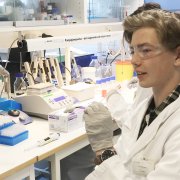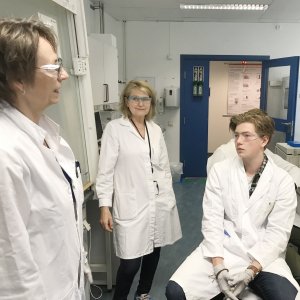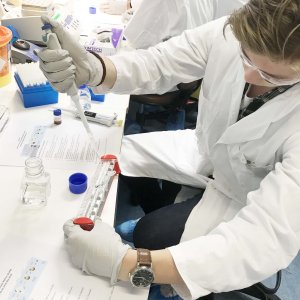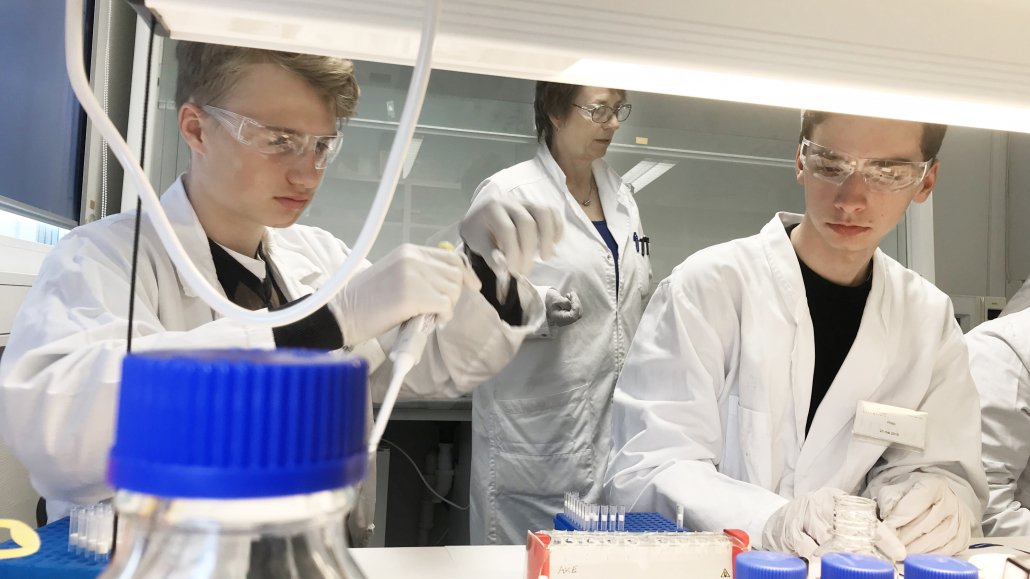Cell therapy breakthroughs in cancer treatment
The Section for Cellular Therapy’s Translational Research Unit in Norway has recently published two groundbreaking studies demonstrating the potential of cell-based therapies in the fight against cancer. The research group used the Oslo Cancer Cluster Incubator labs to develop pre-clinical treatments.
The collaborative team from Oslo University Hospital and the University of Bergen have made significant progress towards developing more effective and targeted treatments for advanced and treatment-resistant cancers.
Tackling colorectal cancer resistance
The first study, titled “Transient TCR-based T-cell therapy in a patient with advanced treatment-resistant MSI-high colorectal cancer,” focuses on a novel approach utilizing T-cell therapy to treat metastatic colorectal cancer. Published in a reputable journal, the study details the successful and safe application of a transient T-cell receptor (TCR) therapy named Radium-1 in a patient with advanced colorectal cancer resistant to conventional treatments. The therapy is named Radium-1, as it was discovered at the Radium Hospital (now part of Oslo University Hospital).
Dr Else Marit Inderberg, one of the lead researchers, explains the rationale behind their approach, stating,
“We aimed to modify the immune system to recognize and destroy tumour cells effectively. We transferred TCRs from responsive patients to non-responding ones, leading to promising results in our clinical trial.”
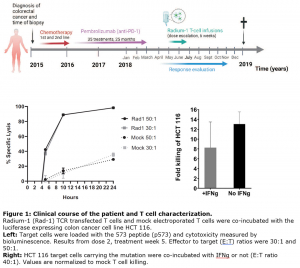
The therapy involves modifying a patient’s T cells to express the Radium-1 TCR using messenger RNA (mRNA) technology. Despite the challenging nature of advanced colorectal cancer, the treatment was well tolerated by the patient and resulted in stable disease, offering hope for further investigation in larger clinical trials.
Breakthroughs in ovarian cancer treatment
The second study, titled “Efficient CAR T cell targeting of the CA125 extracellular repeat domain of MUC16,” introduces a novel Chimeric Antigen Receptor (CAR) T-cell therapy targeting ovarian cancer. Ovarian cancer remains a significant challenge due to late-stage diagnosis and chemoresistance, making the development of new therapeutic strategies imperative.
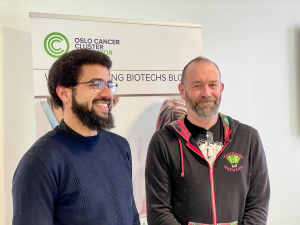
Co-author Christopher Forcados and lead author Nicholas P. Casey. Photo: Oslo Cancer Cluster
Dr Nicholas P. Casey, the lead author of the study, emphasizes the importance of their research, stating, “Our CAR T-cell therapy targeting the CA125 extracellular repeat domain of MUC16 shows promising efficacy in preclinical models, offering a potential breakthrough in ovarian cancer treatment.”
The CAR T-cell therapy has shown promising results in both in vitro experiments and patient-derived xenograft mouse models. This paves the way for future clinical trials aimed at advancing CAR T-cell therapy for ovarian cancer patients. The development of these therapies took place in the fully-equipped laboratories of Oslo Cancer Cluster Incubator, specifically designed for carrying out these processes.
New hope and results ahead
These pioneering studies highlight the transformative potential of cell-based therapies in revolutionising cancer treatment. With further research and clinical validation, these innovative approaches could offer new hope for patients battling advanced and treatment-resistant cancers, and getting closer to realizing the vision of personalized and targeted cancer therapy.
As Dr Sebastien Wälchli, co-author of the studies, fittingly summarizes, “These findings underscore the importance of collaborative research efforts in advancing cancer immunotherapy and signify a significant step forward in our ongoing battle against cancer.”
The research group is anticipating the publication of a third article, which is expected to contain groundbreaking results. Stay tuned for further updates.
What is T-cell therapy for colorectal cancer:
Imagine your body has soldiers called T cells. These cells can recognize and fight against harmful things like cancer cells. In this therapy, scientists take T-cells from a patient’s body. Then modify these T-cells in a lab to make them better at recognizing and attacking cancer cells. It’s done by giving the T-cells a special weapon called Radium-1.
However, these modified T cells don’t stay in the patient’s body permanently. Instead, they are given back to the patient temporarily. These modified T cells go on a mission to find and destroy cancer cells. Even though they’re only there briefly, they can still make a big impact in fighting cancer cells.
What is CAR T-Cell Therapy for Ovarian Cancer:
In this therapy, scientists create special T cells called CAR-T cells. These T-cells are trained to recognize a specific target on ovarian cancer cells called MUC16. These CAR-T cells are specifically designed to find ovarian cancer cells.
In simpler terms, both therapies involve giving the body’s immune system a boost to help fight cancer more effectively. It’s like giving the immune system an upgraded set of tools to target and destroy cancer cells.


